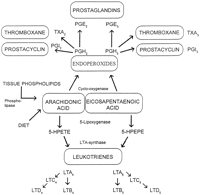Omega-3 Fatty Acids in Inflammation and Autoimmune Diseases -2The Center for Genetics, Nutrition and Health, Washington, D.C
The first evidence of the important role of dietary intake of omega-3 polyunsaturated fatty acids (PUFAs) in inflammation was derived from epidemiological observations of the low incidence of autoimmune and inflammatory disorders, such as psoriasis, asthma and type-1 diabetes, as well as the complete absence of multiple sclerosis, in a population of Greenland Eskimos compared with gender- and age-matched groups living in Denmark [1]. Most of these diseases are characterized by inappropriate activation of T cells resulting on and ultimately destruction of host tissues. In the 1980’s several independent lines of evidence suggested that changes in the natural history of hypertensive, atherosclerotic and chronic inflammatory disorders may be achieved by altering availability of eicosanoid precursors. Native Greenland Eskimos [2] and Japanese [3] have a high dietary intake of long chain omega-3 PUFA from seafood and a low incidence of myocardial infarction and chronic inflammatory or autoimmune disorders, even when compared to their Westernized ethnic counterparts. Diets containing omega-3 PUFA have also been found to reduce the severity of experimental cerebral [4] and myocardial [5] infarction, to retard autoimmune nephritis and prolong survival of NZB x NZW F1 mice [6,7] and reduce the incidence of breast tumors in rats [8]. The 1980s were a period of expansion in our knowledge about PUFAs in general and omega-3 fatty acids in particular. Today we know that omega-3 fatty acids are essential for normal growth and development and may play an important role in the prevention and treatment of coronary artery disease, hypertension, arthritis, other inflammatory and autoimmune disorders and cancer [9]. Research has been carried out in animal models, tissue cultures and human beings. The original observational studies have given way to controlled clinical trials. In this paper, I review the anti-inflammatory aspects of omega-3 fatty acids relative to prostaglandins and cytokines and their clinical effects in inflammatory and autoimmune diseases, such as cardiovascular disease, major depression, arthritis, inflammatory bowel disease, asthma and psoriasis.
Omega-6 fatty acids account for the majority of
polyunsaturated fatty acids (PUFA) in the food supply. They are the
predominant PUFA in all diets, especially Western diets. When diets
are supplemented with omega-3 fatty acids, the latter partially
replace the omega-6 fatty acids in the membranes of practically all
cells (i.e., erythrocytes, platelets, endothelial cells, monocytes,
lymphocytes, granulocytes, neuronal cells, fibroblasts, retinal
cells, hepatic cells and neuroblastoma cells).
Many factors contribute to the complex course of
inflammatory reactions. Microbiological, immunological and toxic
agents can initiate the inflammatory response by activating a
variety of humoral and cellular mediators. In the early phase of
inflammation, excessive amounts of interleukins and lipid mediators
are released and play a crucial role. Pro-inflammatory eicosanoids
of AA metabolism are released from membrane phospholipids in the
course of inflammatory activation. EPA is released to compete with
AA for enzymatic metabolism inducing the production of less
inflammatory and chemotactic derivatives.
Similarly, increasing the intake of omega-3 fatty acids
while decreasing the omega-6 fatty acids in the diet has led to
improvements and a decrease of non-steroidal anti-inflammatory
agents in patients with rheumatoid arthritis [33,34] and asthma
[35].
Received May 21, 2002. Accepted August 15, 2002. |
CIDPUSA Foundation
Omega -3 section | ||
| For treatments of autoimmune disorders please read our e-book | ||
Next Topic: continue to page-2 of coconut oil benefits
|
Autoimmune attack
| |
service for health emotional physcial freedom |
||
